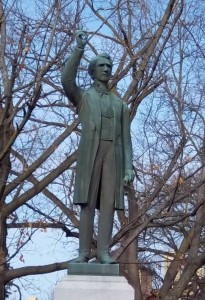From The New-York Times February 6, 1861:
GOV. SEWARD’S VIEWS ON SAVING THE UNION.
— The Washington correspondent of the Boston Advertiser gives the following reply of Gov. SEWARD, to the urgent requests that he would assent to measures of compromise:
“The pressure has been very strong on the Republicans to yield to something like Mr. CRITTENDEN’s measures, but it is of no use. When people press Gov. SEWARD to yield to this, in order to save the country, he replies: ‘Gentlemen, you think I can save the country by sacrificing myself. Suppose I were to save the country as you wish, I should have put an end to my power for good or evil forever. I shall have to go back to Auburn and amuse myself with writing history for the rest of my life. I am not so blind to experience as to suppose that I can both sacrifice myself and remain leader at the same time. Now, do you want me to retire from public life?’ The answer is of course, ‘No, Governor; we can’t do without you.’ ‘Then,’ returns he, ‘you must let me save the Union in my own way.'”
If is a defect, perhaps, in political communities, and especially in our political parties, to place too little confidence in the wisdom and fidelity of those whom they have chosen to be their representatives. One would suppose that if there is any such thing as proved fidelity, Gov. SEWARD had made good his title to the confidence of those who deprecate and resist the extension of Slavery. He may fairly claim the right to exercise his own judgment, as to the best means of attaining this result, without subjecting himself to the suspicion of disloyalty to his principles or unfaithfulness to his friends. Yet he is denounced by the Tribune as ready to abandon both, because he intimates a desire to preserve the Union even at the sacrifice of some points upon which, under other circumstances, he would insist. We think Mr. SEWARD may fairly claim the right to be allowed to “save the Union in his own way.”
Oh, so that’s the definition of “hubris”.
I guess the Unionists of Bunker Hill were not the only ones who considered Seward the premier of the Lincoln administration. James McPherson in Battle Cry of Freedom (p.260 in Ballantine Books 1989 edition) supports the idea that Seward, at least initially, considered himself the premier.
You can find this article about William H. Seward at The New York Times Archive.

